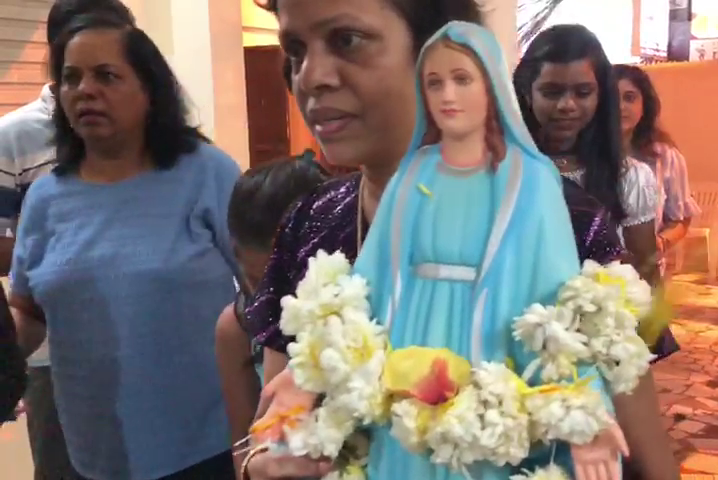Panaji, May 19, 2017 … The Governor of Goa Dr. ( Smt ). Mridula Sinha has conducted a study on ‘the Practice and Effects of the Civil Code in Goa’. She has come out with a report on the subject which contains the findings of her study which she has gathered after several interactions with the women, specially different religious residing in Goa and heads of the various religious groups. Each group member belonged to a different field of profession.
The study was intended to understand the impact of the Code on the lives of women of diverse communities residing in Goa and to look for discrepancies, if any. The objective who also to ascertain how the Code has brought in unity and social harmony among all women of six communities residing here.
The Governor in her report has laid emphasis on the need to create a single identity for women as Indian Women i.e. one nation and one identity for women, and she has found that practice of Goa Civil Code has led to strengthening of this identity. The Goa Civil Code in true spirit, integrates the society and creates social solidarity.
The report says that the basic problems in today’s world have evolved from the collapse of family values leading to alienation of youth. In this context, the features of the Goa Civil Code, be it the communion of properties, regime of succession or the compulsory registration of Marriage, etc., have brought tolerance in the family structure as well as led to strengthening of family values.
The report narrates some of the salient features envisaged in the Goa Civil Code which are as under :
a) Compulsory Civil Registration of a marriage
b) Monogamy : Polygamy is prohibited except in certain circumstances where first wife is not able to reproduce till the age prescribed therein. But Hon’ble Governor has not favoured even this exception as this is in violation to gender equality and is against women’s right.
Under this code, Muslim men can neither practice polygamy nor the verbal divorce is recognized in this State because no such provision exists in the Code and secondly the Muslim Personal Law Application Act 1937 has niot extended to the State of Goa.
c) Age of Marriage : Provision of minimum age for marriage for boys and girls of 21 and 18 years respectively which, leaves no scope for child marriages.
d) Consent for marriage : Contract of the marriage can’t end in vanity, Mutual consent is essential for contract of marriage.
e) Inheritance : After marriage each spouse jointly hold ownership to the assts before marriage and on divorce, each is entitled to half share of the joint assets. Law also allows pre-nuptial agreement under which the parties can define their shares mutually in case of divorce.
A married person requires consent of the other spouse while disposing property. Another important feature is that the parents cannot disinherit the children entirely, and are required to pass on atleast half of their property to the children. And, irrespective of the gender, the inherited property has to be shared equally among children.
The Governor adopted methodology of interaction with the women of six communities and group of religious leaders residing here and designed a questionnaire. Analyses thereof were carried out to draw her findings and conclusion.
On understanding the practices of each religion, after the interactions, the Governor was impressed with the practice of pre-marital counseling practiced in Christianity which prepares and educates the prospective bride and groom on their rights and responsibilities arising out of their marriage relationship. The need for pre-marital counseling was supported by women of all communities since counseling saves many marriages and families from breaking. The Governor in her report has recommended the Governments at the State and Centre to take steps to make pre-marital counseling a prerequisite for Marriages/Marriage registration in all the communities.
She has also appreciated the existing practice in some religions of counseling in cases of divorce, and granting it after due course. The decision if any, in such cases is ratified by the Family Courts. She also observed that for marriages, the Church facilitates transfer of documents to Registrar once the marriage is solemnized in Church, and therefore the couple visits Registrars office only once. Hence, the Governor was of the view that such practice may be extended to Hindus as well as Muslims.
The Governor in her report has suggested that boys and girls at school levels should be trained on how to respect each other, as this will inculcate moral values and endeavour to form responsible citizens.
The Governor also stressed in her report the role of voluntary organizations working the cause of women to create awareness regarding the Civil Code and its benefits by way of workshops, training session and through print and electronic media.
Thus, the Governor in her findings in the report has observed that the status of women belonging to different religious in Goa is much better than the status of women elsewhere in the Country and one of the important reasons she attributes to the practice of Common Civil Code in Goa. The impact has contributed to the peace and harmony in the Goan society. She has opined in her report that the Goa Civil Code is in favour of women’s interest, well being and it will in the long run endeavour to achieve the goal of ‘one identity for women’.




